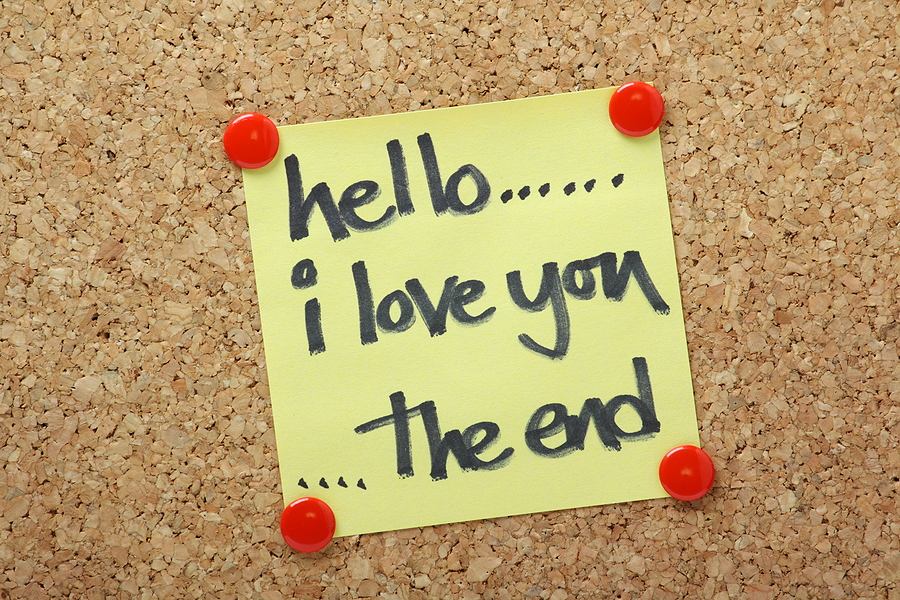I’ve been writing for publication since my teen years, when the world was young and the Garden of Eden’s discount fruit stand was still in business. As you might imagine, I’ve worked with more than a few editors over the years (and even been an editor myself). Though some writers see editors as “the enemy” (or perhaps the stumbling blocks in their paths), I’ve always had great relationships with my editors and have even learned a thing or two from them. Here are three things I learned from editors:
“You can never finish a piece of writing.”
One of my early editors was fond of saying—well, a lot of things, and some even made sense, but just one I’ll mention here—“You can never finish a piece of writing; you must abandon it.” That nugget of wisdom may not have been his creation, but it stuck with me. It’s saved me from my Type A/OCD tendency to overthink and endlessly revise something I’ve written. Whether I’m writing a devotion, a feature article, a blog post, or a book, there comes a point after numerous critiques, edits, and revisions, when I abandon my “little darlings” to the editor and the reading public. I often see, after publication, something I could’ve done better, but I’ve learned not to make perfection my goal; excellent, effective, and timely communication is.
“Give good copy on time.”
Early in my experience as an author—after my first book’s release and after the next two were in the editorial process—I had the opportunity to have lunch with my big, important book editor (at a big, important publishing house). I asked him to critique my writing and give me advice. He thought for a few moments, then said, “If I thought long enough, I’m sure I could come up with some constructive criticism; but the bottom line is, you give me good copy on time.” Flummoxed, I said, “Seriously? Is that it? ‘Good copy on time?’” He nodded. “You’d be surprised,” meaning that a writer who meets deadlines was rarer than one might think. Since that day, I’ve never missed a deadline. I’ve renegotiated a few, but always make sure to meet—or beat—the deadlines I’m given.
“Use contractions.”
Now that I’ve written and published millions of words, you’d think that I know a thing or two, right? Apparently not, because not long ago I turned in a manuscript to a trusted editor who turned it quickly back to me, saying, “Dude, use contractions.” I had no idea what this editor was talking about; I use contractions. But then I scanned my copy and realized that in this project, at least, I had sometimes taken a more formal, didactic approach than is my wont (I may also have said things like “than is my wont”). So, I combed through the manuscript and changed numerous (not all, but a lot) instances of “do not” and “will not” and so on to “don’t,” “won’t,” etc. As you might expect, the changes made the whole thing more conversational, which was highly desirable for that particular project. And here I thought I knew how to write.
These are only a few examples of things I’ve learned from editors. Oh, one more: A good editor is your friend. Maybe even one of your best friends. He or she can teach you a lot, if you’re willing to learn. So, what are some things you’ve learned from an editor?





I just sent my manuscript off to the editor for the second time. I looked at it again yesterday and saw four things I needed to change. This is after going over it at least forty times! Your post made me feel better. Maybe you can’t turn in a perfect manuscript. But, I’m going to give it my best shot. My goal is perfection. I got told the same thing about the contractions.
Gchops
If there was one thing I encourage writers to take to heart, it’s that first piece of wisdom. I cannot tell you how much time I have wasted endlessly revising stuff and my productivity is far less than it should be.
It’s so hard to let go because you think “I can make it better if I just….” Being meticulous and perfectionist is good but only to a point. If you carry it too far, it’s crippling.
In living through God’s edit
of my expected days,
I have to give Him credit
and have to give Him praise,
for there’s a certain fitness
in dying oh-so-young;
in bearing faithul witness
to hard days lived among
the ruins of the dreams I had,
now purposed to His grace
that in their desolation add
a clarity to face
the trials that yet lie close ahead
and blessings that are daily bread.
I have never worked with an editor. I can see it is a bad idea for an author to be his or her own editor If Gchops worked on his stuff 40 times before the editor put it right! If I had one,we’ll be great friends. I am always a willing pupil. Thanks Bob for the look out to use contractions appropriately.
God bless you, Bob.Amen.
Hi, Bob-
Could it be your love of Shakespeare that tempts you to wax on? 🙂
My love of the poets, and C.S. Lewis, and writers of yore for me.
There’s always more that can be said, and in a better way.
But sometimes less is more. Or it could be-
The one that got away.
Blessed Relief.
Sigh.
A thousand thanks!
Bob,
As always, you managed to make me smile while teaching me valuable lessons.
I also sincerely appreciate your use of “he or she” when refering to the antecedent “editor.”
I hope my refusal to be politically correct will not hinder my publishing efforts. Who decided it was permissable to use “they” to refer to a singular antecedent anyway?
Ready to leave this sinful world, I am sincerely yours,
Jane Duquette
Bob, I can appreciate what you’re saying and I thank you for saying it. However, I cringe at the contractions statement. You qualified that tidbit, saying the conversion to contractions “was highly desirable for that particular project.”
So, is that always the case? Are there projects/audiences that call for a more formal writing style? Should OLUSOLA, above, have opened with “I’ve never worked with an editor,” rather than “I have never . . . ?”
Seriously, Bob, because these are borderline gut-wrenching questions for me. A woman in my critique group (whom I very much respect) constantly grinds at me regarding my formal style with affectionate ribbing, “Welcome back professor Gray!”
I’m glad you picked up on “for that particular project,” Damon. That’s key. A more formal style is more appropriate for some projects or publishers…or topics, even. But it’s not worth wrenching any guts over.
Though he’s not an editor, I often repeat my husband’s advice to myself. While I was revising a major piece, he asked me if it was good. I said yes and he replied, “Don’t un-good it.”
I was so happy you said we ought to use contractions. That’s my style of writing: conversational. In fact, my WIP contains lots of them. When I submitted it to an agent at a writer’s conference recently, she liked it. Thanks for your always-helpful advice.
I’m sorry Roberta, we can no longer be friends!
😉
😉
I’ve been an editor, and I respect and appreciate what an editor can do. My motto: “Every writer needs an editor.” The trick as a writer is knowing when to tell my inner editor to back off and let me complete this draft.
As an author wannabe, I appreciate your KEY list. My editor (and friend) told me to write my memoir only with my casual voice. My first vomit manuscript draft fluctuates between my personal voice, my attorney voice and my past-English-teacher voice. I need to flow with easy contractions of my heart and soul (not specificity).
You are a genius Andrew!
Ah, I think it is a habit with me not to use contractions, Damon.
Your comment made me conscious of that.
So, I should say: You’re a genius Andrew!
So Damon, I think I should have begun with – I’ve never worked with an editor.
Writers should use contractions to sound light, informal, chatty, friendly as I wish to appear on this forum.
Hope I am still your friend. Sorry! Hope I’m still your friend(:
My editor has taught me that even a published, revised-more-times-than-I-can-count manuscript can still be made better when given a second chance at life. We’re almost finished rewriting my first novel for a new publisher (who gave me this brilliant editor) and I’m learning that she is a genius at showing vs. telling, and I . . . am not.
Thanks for your post, especially regarding contractions. I’m guilty of letting Grammarly “talk” me into eliminating them.
Thank you, Steve, for all the valuable information you give us to make us writers use the gift God has given us to honor Him.
I read your Blog and hungrily devour your all your words of wisdom. And I look forward to your emails.
Nice work, Bob. When I was writing my dissertation (400 pages on House, M.D., should you want to have a look), I had about six re-writes. I learned to be humble, that my editor had more experience than I did, and that he sometimes changed his mind on wording. More than once.
Thanks for sharing your your thoughts an knowledge of book writing.
I am publishing my first picture book. I was wondering where can I get a good formater because my person is on a siesta?
I am grateful as a new writer for all I’ve learned from the Steve Laube emails. I took out all words like that and made sentences crisp. I have a formal well educated woman who speaks “I do not.”. Her caretaker, with less education says “I don’t,” Both are in my book.
Writing is a process, a long process, learning what you need to know.
Every writer needs an editor because you can never read your own manuscript again for the first time.
I appreciated these words of wisdom from editors. Being Type A/OCD, myself, I needed that reminder to abandon and send at some point. It also made me happy to hear your meeting deadlines was such a good thing–so far I’ve always met my deadlines, too! Now I am/I’m going back through my last bit of writing to look for contractions!! Thanks, Bob!